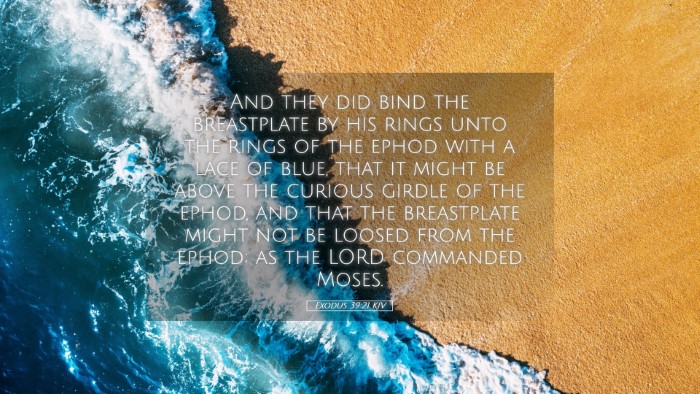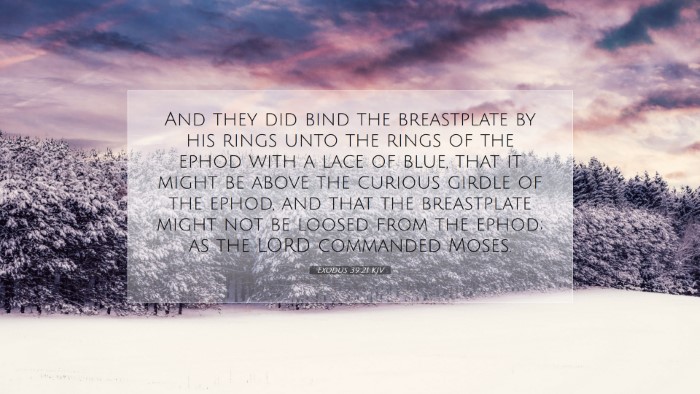Commentary on Exodus 39:21
Verse Reference: Exodus 39:21 - "And they did cloth the breastplate of judgment with the Urim and the Thummim."
Introduction
The verse Exodus 39:21 plays a critical role in understanding the significance of the garments of the high priest, and particularly the breastplate of judgment. This piece of the high priest's attire served not only a ceremonial function but also a divine purpose—acting as a means through which God communicated His will to His people. Among the classic commentaries available, insights from Matthew Henry, Albert Barnes, and Adam Clarke provide a rich tapestry of theological reflections on this verse.
Significance of the Breastplate
The breastplate of judgment is described as beautifully crafted and intricately designed, reflecting the glory and holiness of God. According to Matthew Henry, this breastplate was emblematic of the high priest's role as an intermediary between God and the people of Israel. Specifically, Henry emphasizes:
- Divine Representation: The breastplate contained the twelve stones representing the twelve tribes of Israel, symbolizing the high priest bearing the names of the people before the Lord.
- Judicial Authority: The term 'judgment' indicates the breastplate’s role in seeking divine guidance, which was pivotal during times of decision-making.
Urim and Thummim: Tools of Discernment
The reference to the Urim and Thummim introduces a mysterious yet crucial aspect of the high priest's functions. Albert Barnes notes that while their exact nature remains uncertain, their use signifies a method by which God’s will was revealed to His people. Through these instruments:
- Divine Guidance: The high priest would consult the Urim and Thummim for obtaining guidance on complex issues and moral decisions faced by the nation.
- God's Sovereignty: The use of these tools emphasized God's direct involvement in the lives of His people, signifying that He was actively engaged in their leadership and decisions.
The Role of the High Priest
Adam Clarke extensively discusses the high priest’s role as both a spiritual leader and a mediator. The high priest's garments, including the breastplate, represented a link between God and humanity; Clarke writes about:
- Spiritual Intercession: Each element of the high priest's attire contained theological significance, portraying the weight of responsibility placed on the high priest to intercede on behalf of the people.
- Communal Identity: The incorporation of the tribes within the breastplate highlighted the corporate identity of Israel, emphasizing that the decisions made were not merely personal but communal in nature.
Theological Implications
This verse raises profound theological reflections pertinent for pastors and theologians today. The breastplate, along with the Urim and Thummim, signifies:
- The Importance of Guidance: Just as the high priest sought guidance from God, present-day leaders and believers are encouraged to seek divine wisdom in their endeavors, suggesting a model of reliance on God for direction.
- Sacrificial Leadership: The high priest’s garments symbolize the call to self-sacrifice and dedication among spiritual leaders—encouraging them to bear the burdens of their communities with reverence and commitment.
- Representative Ministry: This passage emphasizes the call for church leaders today to represent their congregations before God, interceding on their behalf through prayer and supplication.
Conclusion
Exodus 39:21 serves as a rich reminder of the intersection between sacred tradition and the unchanging nature of God’s will. The high priest's breastplate—crafted with purpose and imbued with significance—served as a boundary between the divine and human realms. Through the insights of respected commentators, we are reminded of the weighty role of leaders in seeking God’s counsel and the profound responsibility held by those who represent the community before Him. In today's context, this calls for renewed dedication to the principles of divine guidance, collective representation, and sacrificial leadership.


